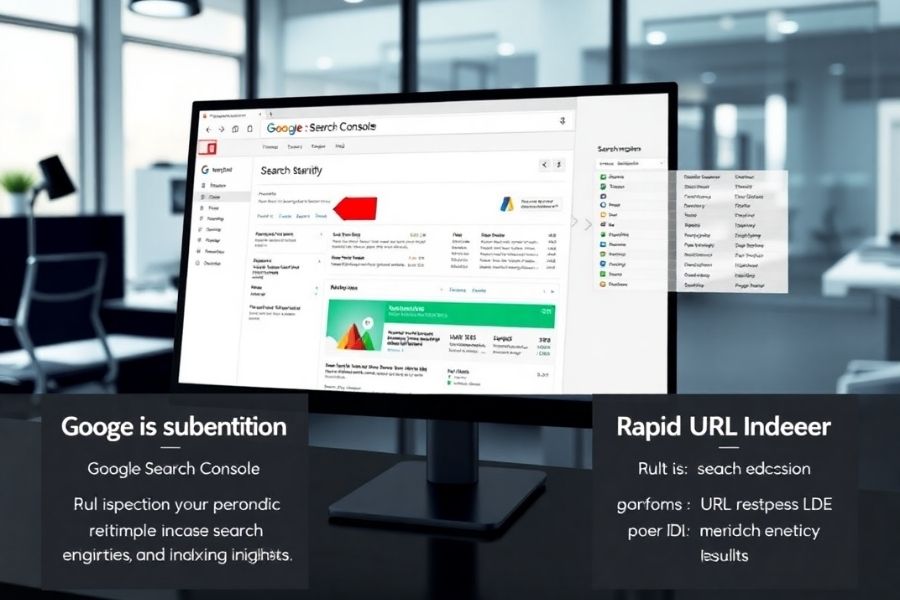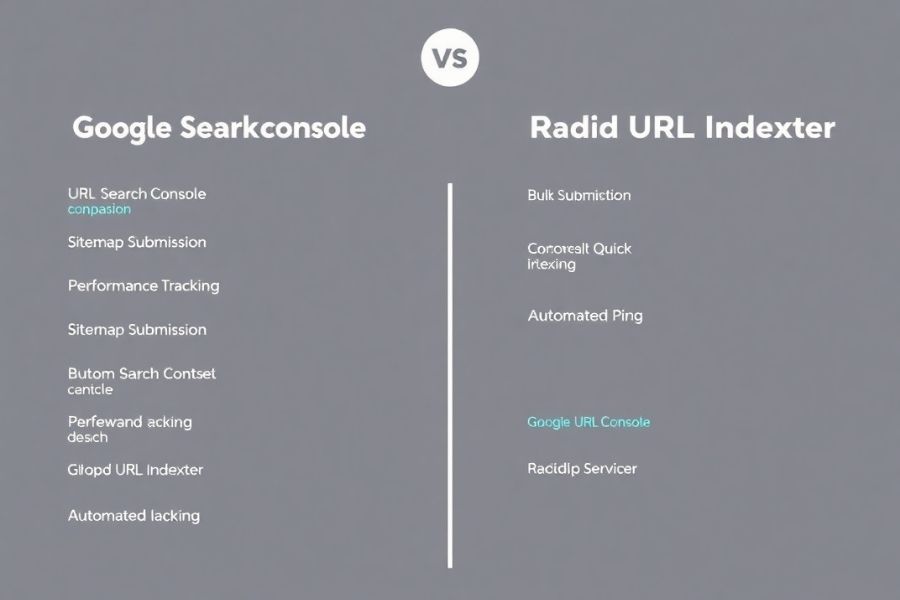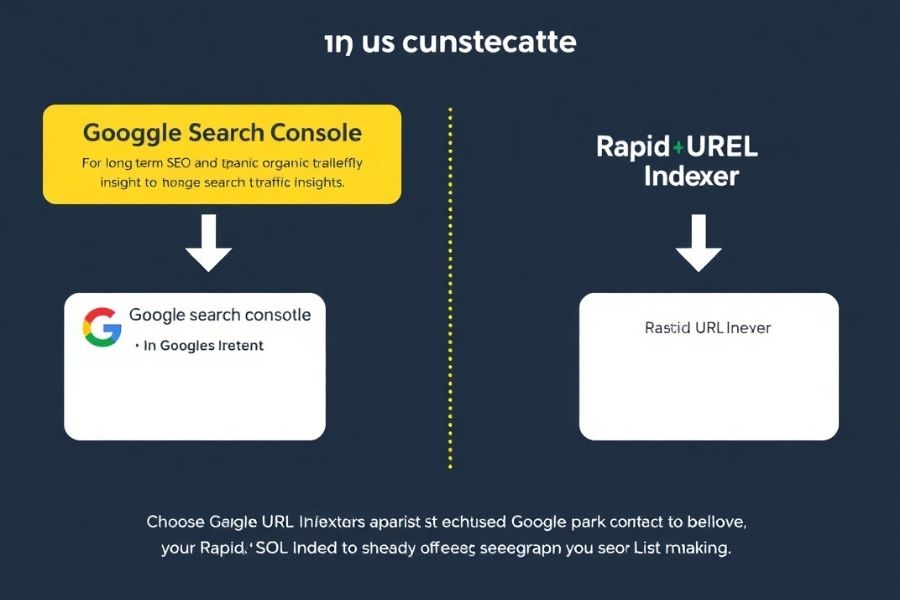In today’s competitive digital marketing landscape website indexing is essential for improving visibility on search engines like Google. Two commonly used tools for this task are Google Search Console (GSC) and Rapid URL Indexer.
While both aim to get your web pages indexed, they vary significantly in terms of methodology, features, and efficiency.
This article compares Google Search Console vs Rapid URL Indexer to help you determine which tool best fits your SEO strategy.
What is Google Search Console?

Google search console vs Rapid url indexer is a topic often discussed in SEO communities, as both tools play an important role in website indexing.
Google Search Console is a free SEO tool provided by Google that helps webmasters monitor, maintain, and troubleshoot their site’s presence in Google Search results.
It offers valuable data about how Google crawls and indexes your website and helps identify technical issues that could affect search rankings.
Key Features of Google Search Console
- URL Inspection Tool – View how individual pages are indexed.
- Sitemap Submission – Help Google crawl your site more efficiently.
- Performance Reports – Track clicks, impressions, CTR, and keyword rankings.
- Coverage Reports – Identify crawl errors and indexing issues.
- Backlink Insights – Understand your external and internal linking structure.
- Mobile Usability Report – Check if your site is mobile-friendly.
What is Rapid URL Indexer?
Rapid URL Indexer is a third-party, paid indexing tool designed to accelerate the indexing process for new or updated web pages. Unlike Google Search Console, it focuses solely on fast indexing and doesn’t offer broader SEO insights.
Key Features of Rapid URL Indexer
- Fast Indexing – Speeds up visibility of new content in search engines.
- Bulk URL Submission – Submit multiple URLs at once to save time.
- Automation – Pings search engines automatically after submission.
- Multi-Search Engine Support – Works with Google, Bing, Yahoo, and more.
- Social Media Integration – Automatically shares URLs to increase visibility.
Google Search Console vs Rapid URL Indexer: Comparison Table

| Feature | Google Search Console | Rapid URL Indexer |
|---|---|---|
| Indexing Speed | Slower – relies on Google’s natural crawl schedule | Faster – uses direct ping and submission |
| Bulk Submission | No – URLs must be submitted one at a time | Yes – supports mass URL submissions |
| Performance Tracking | Yes – impressions, CTR, keyword data | No |
| Free or Paid | Free | Paid (with a free trial available) |
| SEO Insights | Yes – includes analytics, mobile usability, etc. | No – indexing only |
| Search Engine Support | Google only | Google, Bing, Yahoo, and more |
Google Search Console vs. Rapid URL Indexer: Detailed Insights
When comparing Google Search Console vs Rapid URL Indexer, it’s clear that both serve very different purposes:
Rapid URL Indexer is a great tool for speeding up indexing, especially when publishing time-sensitive content or launching a large batch of new pages.
Google Search Console is ideal for long-term SEO strategies. It offers technical insights, performance data, and optimization recommendations straight from Google itself.
Which Tool Should You Choose?

Your choice depends on your SEO goals:
- Choose Google Search Console if you want to monitor website performance, resolve technical SEO issues, and gain keyword insights – all for free.
- Choose Rapid URL Indexer if you need faster indexing and don’t want to wait for Google’s natural crawl process.
- Use Both Together for optimal results: GSC for insights and monitoring, and Rapid URL Indexer for faster content visibility.
For the best SEO results, it’s recommended to use both tools together: GSC for ongoing optimization and Rapid URL Indexer for quick indexing of new content.
Conclusion
Both Google Search Console and Rapid URL Indexer are useful tools in an SEO toolkit, but they cater to different needs. GSC is essential for ongoing optimization and performance tracking, while Rapid URL Indexer offers a fast-track approach to indexing new content.
Combining both tools can give your site a strategic advantage in both speed and search visibility.By leveraging both, website owners can enhance their SEO strategy and improve their site’s visibility faster and more efficiently.
FAQS
What is the difference between a URL and site property in Google Search Console?
A URL inspection checks the indexing status and crawl data of a specific page, whereas a site property provides insights into the overall health, coverage, performance, and issues of the entire website.
How is Google Search Console different from Semrush?
Google Search Console is a free tool from Google that focuses on indexing, search visibility, and technical SEO data. Semrush, on the other hand, is a paid all-in-one SEO suite offering advanced features such as keyword research, competitor analysis, backlink tracking, and PPC data.
What’s the difference between Google Search Console and Google Analytics?
Google Search Console is focused on how your site appears in search engine results, tracking indexing, search queries, and crawl issues. Google Analytics monitors user behavior, session duration, bounce rate, and traffic sources once users land on your website.
Is Google Search Console good for SEO?
Yes, it’s one of the most essential tools for SEO. Google Search Console provides data on crawl errors, mobile usability, keyword performance, page indexing, and more—helping site owners fix issues and boost visibility.
Can I use Google Search Console for any website?
Yes. You can use Google Search Console for any website once you verify ownership through methods like DNS, HTML tag, or Google Analytics integration.
What was Google Search Console previously called?
Google Search Console was formerly known as Google Webmaster Tools. It was rebranded in 2015 to better reflect its broader focus beyond webmasters.
Does Google Search Console track paid traffic?
No, GSC exclusively tracks organic search traffic. It doesn’t provide data for traffic from paid sources like Google Ads, social media, or referral campaigns.
What are some alternatives to Semrush?
Popular alternatives to Semrush include Ahrefs, Moz, Ubersuggest, and Serpstat. Each platform offers its own unique set of SEO, content marketing, and analytics features.
What is the purpose of Google Search Console?
The primary goal of Google Search Console is to help webmasters and site owners monitor how their site performs in Google Search, detect indexing problems, and optimize content for better search visibility.



